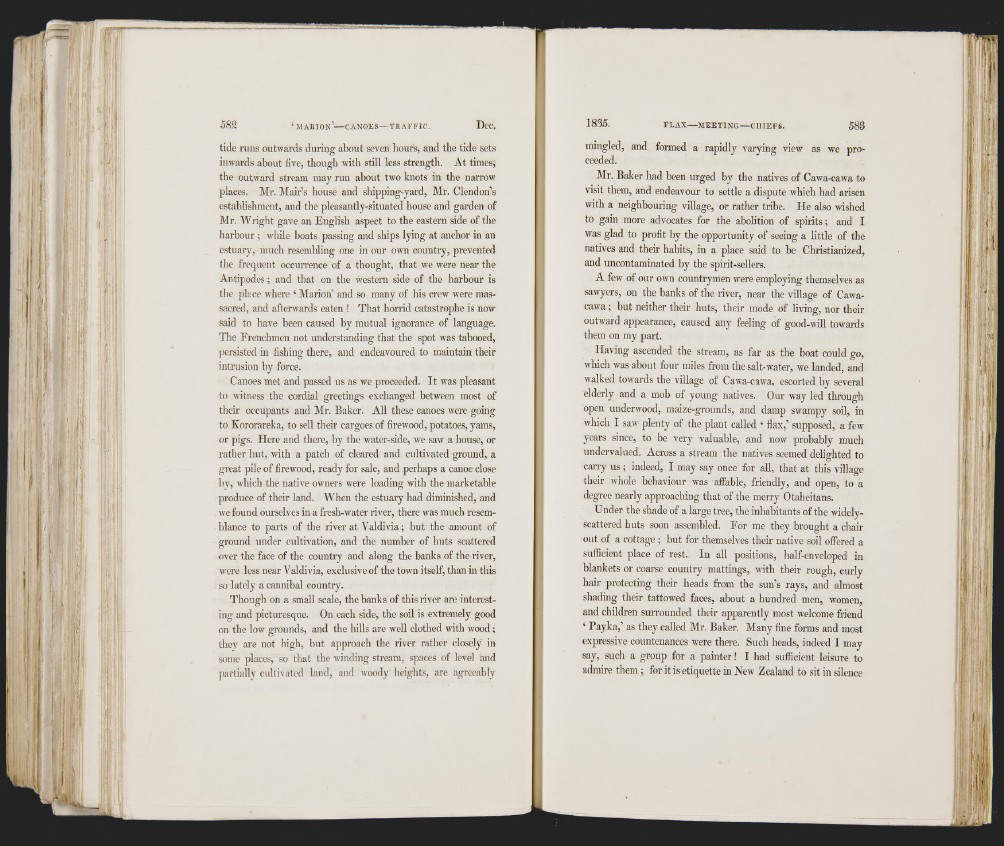
582 ‘ Ma r i o n ’— c a n o e s— t r a f f i c . Dec.
tide runs outwards during about seven hours, and the tide sets
inwards about five, tlioiigh with still less strength. At times;
the outward stream may run about two knots in the narrow
places. Mr. Mair’s house and shipping-yard, Mr. Clendon’s
establishment, and the pleasantly-situated house and garden of
Mr. Wright gave an English aspect to the eastern side of the
harbour ; while boats passing and ships lying at anchor in an
estuary, much resembling one in our own country, prevented
the frequent occurrence of a thought, that we were near the
Antipodes; and that on the western side of the harbour is
the place where ‘ Marion’ and so many of his crew were massacred,
and afterwards eaten ! That horrid catastrophe is now
said to have been caused by mutual ignorance of language.
The Frenchmen not understanding that the spot was tabooed,
persisted in fishing there, and endeavoured to maintain their
intrusion hy force.
Canoes met and passed us as we proceeded. It was pleasant
to witness the cordial greetings exchanged between most of
their occupants and Mr. Baker. All these canoes were going
to Kororareka, to sell their cargoes of firewood, potatoes, yams,
or pigs. Here and tliere, by the water-side, we saw a house, or
rather hut, with a patch of cleared and cultivated ground, a
great pile of firewood, ready for sale, and perhaps a canoe close
by, which the native owners were loading with the marketable
produce of their land. When the estuary had diminished, and
we found ourselves in a fresh-water river, there was much resemblance
to parts of the river at Valdivia; but the amount of
ground under cultivation, and the number of huts scattered
over the face of the country and along the banks of the river,
were less near Valdivia, exclusive of the town itself, than in this
so lately a cannibal country.
Though on a small scale, the banks of this river are interesting
and picturesque. On each side, the soil is extremely good
on the low grounds, and the hills are well clothed with wood;
they are not high, but approach the river rather closely in
some places, so that the winding stream, spaces of level and
partially cultivated land, and woody heights, are agreeably
1835. FLAX MEETING— CHIEFS. 583
mingled, and formed a rapidly varying view as we proceeded.
Mr. Baker had been urged by the natives of Cawa-cawa to
visit them, and endeavour to settle a dispute which had arisen
with a neighbouring village, or rather tribe. He also wished
to gain more advocates for the abolition of spirits; and I
was glad to profit by the opportunity of seeing a little of the
natives and their habits, in a place said to be Christianized,
and uncontaminated by the spirit-sellers.
A few of our own countrymen were employing themselves as
sawyers, on the banks of the river, near the village of Cawa-
cawa ; but neither their huts, their mode of living, nor their
outward appearance, caused any feeling of good-will towards
them on my part.
Having ascended the stream, as far as the boat could go,
which was about four miles from the salt-water, we landed, and
walked towards the village of Cawa-cawa, escorted by several
elderly and a mob of young natives. Our way led through
open underwood, maize-grounds, and damp swampy soil, in
which I saw plenty of the plant called ‘ flax,’ supposed, a few
yeai's since, to be very valuable, and now probably much
undervalued. Across a stream the natives seemed delighted to
carry us ; indeed, I may say once for all, that at this village
their whole behaviour was affable, friendly, and open, to a
degree nearly approaching that of the merry Otaheitans.
Under the shade of a large tree, the inhabitants of the widely-
scattered huts soon assembled. For me they brought a chair
out of a cottage ; but for themselves their native soil offered a
sufficient place of rest. In all positions, half-enveloped in
blankets or coarse country mattings, with their rough, curly
hair protecting their heads from the sun’s rays, and almost
shading their tattowed faces, about a hundred men, women,
and children surrounded their apparently most welcome friend
‘ Payka,’ as they called Mr. Baker. Many fine forms and most
expressive countenances were there. Such heads, indeed I may
say, such a group for a painter! I had sufficient leisure to
admire them ; for it is etiquette in New Zealand to sit in silence
r i , , .■m■J
jit I
m
■ r'
, I.
1 if
‘t
lil